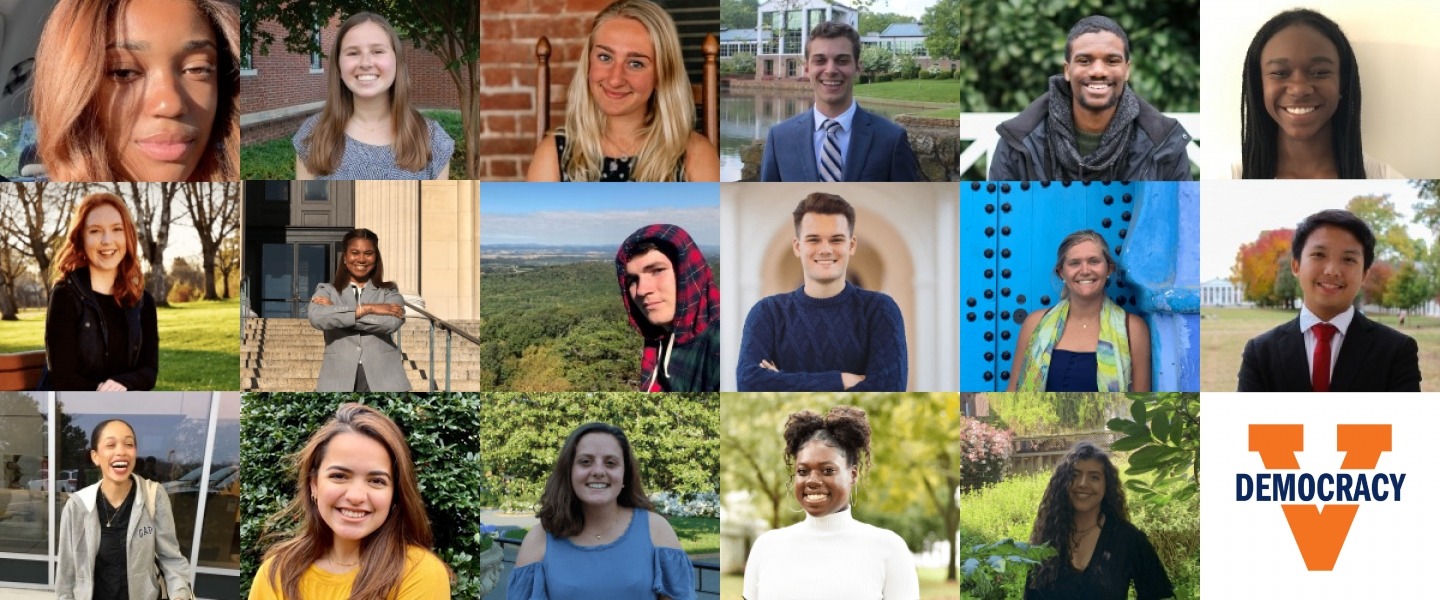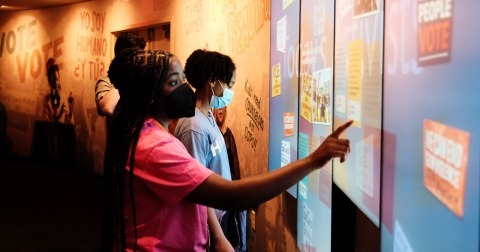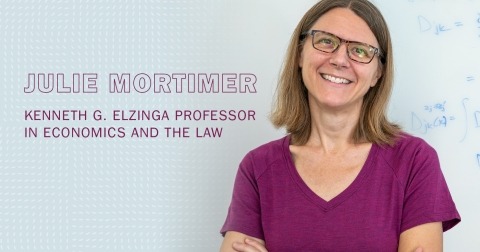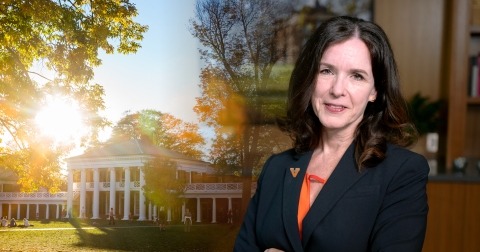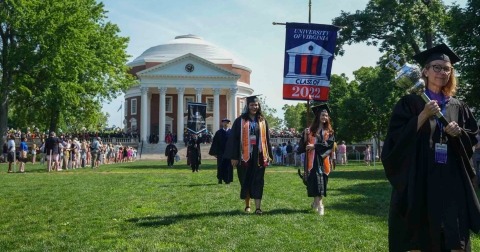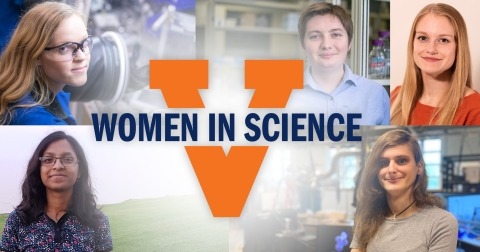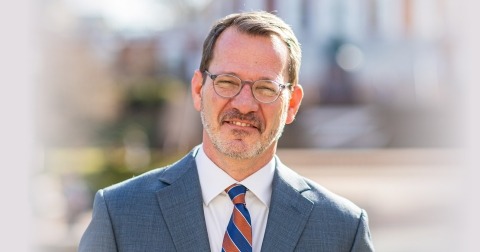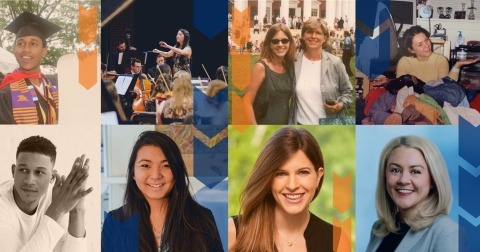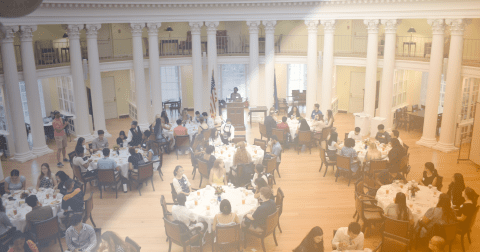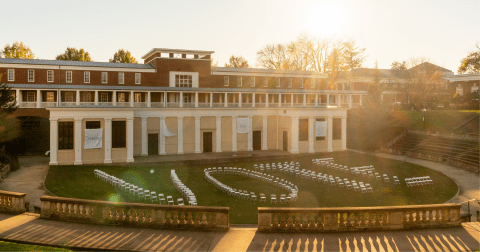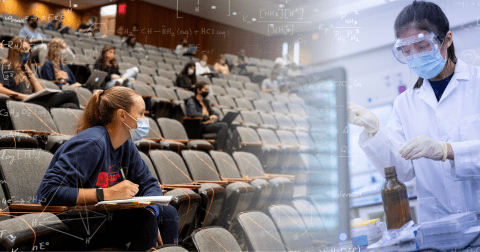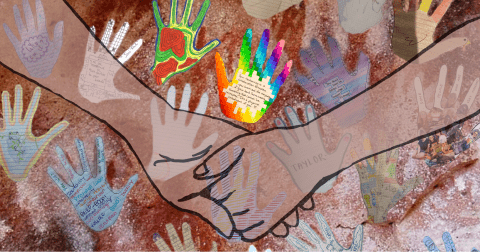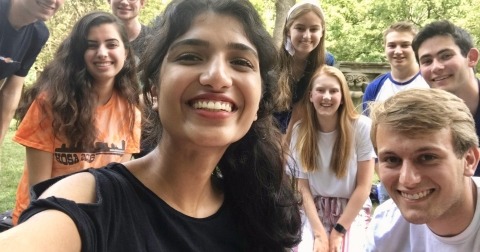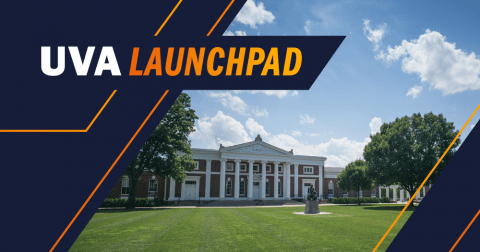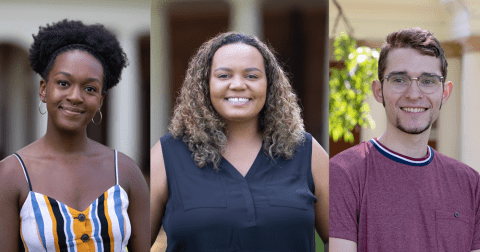Since its formal launch three years ago, the Democracy Initiative has established itself as a prominent platform for the essential study of democratic principles and the critical challenges facing democracies around the world. Its rotating research labs enable University faculty to burrow into emerging key topics, including, most recently, accountability and corruption, democratic statecraft, and religion and race. Complementing the work in the labs, a series of well-received symposia and public events have drawn prominent national and international leaders and policymakers to Grounds.
Characterizing the work of every lab has been a commitment to reaping benefits from the collaborative efforts and perspectives of some of the most prominent UVA and non-UVA scholars and political practitioners dedicated to exploring the core questions about democracy. In the same spirit, the College of Arts & Sciences is seeking to cultivate the next generation of democratic leaders, scholars and citizens. Aiming to engage UVA undergraduate students on the big questions of democracy, democratic culture and democratic practice, the Democracy Initiative Student Advisory Council (or DISAC) was created last year.
“From the earliest days of the Democracy Initiative, we knew that undergraduate student participation would be vital,” said Melody Barnes, the co-director of the Initiative and the executive director of the University’s new Karsh Institute of Democracy. “In the spirit of UVA’s traditions of honor and student self-governance, we gathered and spent time with undergraduates before the pandemic to find out what was important to them about democracy and democratic practice.
“Out of those conversations, the Student Advisory Council was born with 17 fantastic student members representing a variety of backgrounds and political perspectives,” added Barnes.
Among the first activities organized by DISAC was a presidential debate watch party last fall in the Amphitheatre, as well as a social media and public campaign on Grounds to promote increased voter participation in student elections last spring. The students also crafted a constitution for the DISAC to build a solid foundation for the Council and help secure its future.
Former DISAC member Paris Tate, who graduated in May with a bachelor’s degree from the College’s Department of Politics, said the opportunity to create change on Grounds attracted her to the Council’s mission.
“You have a group of people, who — even though we all hold different views politically — can still be cohesive and understand one another. I think that really drew me in,” said Tate, who also served as president of UVA’s NAACP chapter.
Students who participated on the Democracy Initiative Student Advisory Council share their experiences and their hope for the future of democracy, at UVA and around the world.
Serving UVA’s democratic culture
Laurent Dubois, the Democracy Initiative’s co-director for academic affairs, said DISAC helps identify the types of events and research topics that students want to explore.
“And they do that by meeting, deliberating, creating their own structure, and proposing different sorts of programs that we can pursue to contribute to intellectual and political life on Grounds,” Dubois said.
Before joining DISAC last year, fourth year Lawn resident Alex Moreno was already active in the local community. The Political Philosophy, Policy and Law major saw DISAC as an opportunity to cultivate the democratic culture on Grounds, starting with an effort to get students more engaged in student government elections.
“We definitely wanted to focus at first on the democratic culture here at UVA,” Moreno said. “Hopefully, now that we're having in-person meetings again and we can actually host more events and partner with organizations, we definitely want to get involved in local elections and see how we can help motivate students to maybe step out and increase how much they participate inside of UVA and in the community in general.”
Fellow DISAC member Denzel Mitchell, who is double majoring in political and social thought, and economics, and minoring in history, worked with Moreno on DISAC’s subcommittee drafting a constitution for the council. Mitchell considers himself politically progressive but said differences in political perspective among DISAC members did not hinder their attempts to collaborate.
“When it comes to broad topics like protecting democracy and strengthening it, people generally agree,” said Mitchell, who also served as a production intern for the popular “Democracy in Danger” podcast created by the Democracy Initiative’s Deliberative Media Lab. “People may disagree on the particulars, but we kept our focus on big picture conversations.”
And when there have been opportunities to discuss differences of political opinion, DISAC member Devan Coombes said the council has succeeded in cultivating an environment where everyone — not just the loudest people in the room — is empowered to share.
“My opinions aren’t necessarily that of the majority of the student body,” said Coombes, a fourth-year government and American politics major who is an active member of several political organizations and UVA’s Reformed University Fellowship campus ministry. “And I had somebody [on DISAC] who I least expected it from reach out to me and say, ‘Hey, can we jump on a phone call?’ He was like, ‘Well, you have a different opinion, and we all need to hear it. You need to talk more.’ I was just kind of shocked. ‘What do you mean? I know you don’t agree with any of my opinions, I’ve seen your Twitter.’
“And he said, ‘Yeah, no I don’t agree with a lot of the stuff you say, but I do [agree] with a lot of other stuff.’ And that’s a conversation we need to have, especially in this environment.”
Returning and newly appointed members of DISAC met the day before fall semester classes began to plan the year. Building on the success it had in helping to increase voter participation in last spring’s Student Council elections, DISAC wants to work on keeping students engaged with this fall’s statewide elections in Virginia, including the gubernatorial race. It also wants to work with the Democracy Initiative and its partnership with StoryCorps on “One Small Step at UVA” which aims to record interviews between hundreds of community members from UVA, Charlottesville, and Albemarle County over the course of the coming year. The program seeks to bridge political divides through conversations between people with similar backgrounds but different political beliefs.
“You can’t have democracy with just one side,” third-year DISAC member Adrian Mamaril said. “It’s multi-faceted.”

